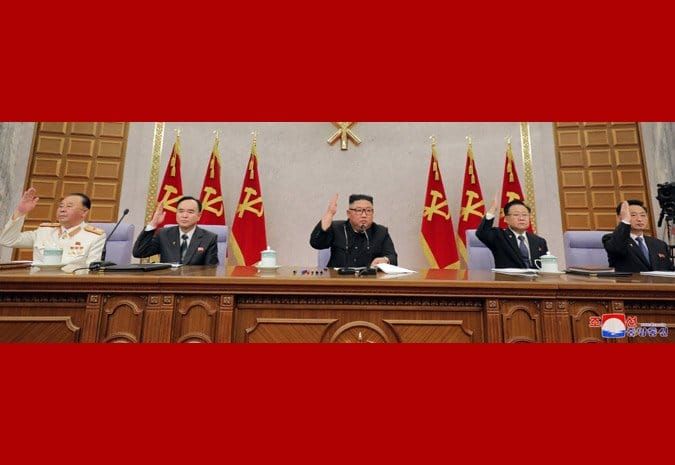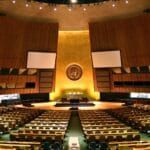What North Korea’s Party Congress means for Biden and the world
By Duyeon Kim | February 12, 2021
 Kim Jong Un (center) at the 8th Workers Party Congress. Photo credit: KCNA via KCNA Watch.
Kim Jong Un (center) at the 8th Workers Party Congress. Photo credit: KCNA via KCNA Watch.
North Korean leader Kim Jong Un unveiled ambitious economic and military plans during his 8th Workers’ Party Congress in January, but those extravagant goals will likely be difficult to implement any time soon. While acknowledging failure of his previous five-year economic plan, he laid out a new one that does not offer any new or viable policy. North Korea aims to rehabilitate its struggling economy by doubling down on self-reliance and centralization rather than implementing economic reforms that continue to allow quasi-market activities by its donju class of financiers and entrepreneurs to remain a source of economic growth. Kim is also apparently masking his country’s weakness with exaggerated displays of military strength by holding military parades and advertising nuclear-weapons capabilities he seemingly does not yet possess. Such displays nevertheless indicate that Pyongyang will attempt to achieve those military milestones in time, if unconstrained.
Kim’s report essentially replaced what has long been an annual New Year’s Day address that outlines marching orders for North Koreans to achieve throughout the rest of the year. The main objective of a Workers Party Congress is to make decisions on party direction and policies and reshuffle the party’s personnel to ensure effective state institutions. This year’s message was to reassert and empower the party in all military and state affairs. A parallel purpose for party congresses, akin to a religious revival service, is to strengthen the faith, solidarity, and loyalty of the clergy of Kim Il Sungism—the political religion and ideology centered on Kim’s grandfather, who was the theocratic regime’s founder and is the “Eternal President” declared by North Korea’s Constitution.
Therefore, the main audience of Kim’s teachings are his Workers’ Party and the North Korean people. However, they still provide clues in understanding Pyongyang’s posture and goals for its economy, nuclear weapons, and foreign relations—all of which have implications for the United States, South Korea, and the region.
Tightening control. Kim’s promotion to general secretary of the country’s Workers Party, reported by state media, and photos of Kim clad in military uniform further signal the reconsolidation of central control amid their economic struggles. Until now, this title was bestowed to his father after his death as “Eternal General Secretary,” while Kim was Chairman of the Party. Perhaps this new title also foreshadows the beginnings of a cult personality in the making for Kim Jong Un, as the family did for his grandfather.
Kim’s remarks are a reminder that the world should neither overestimate nor underestimate his declarations. It is clear that Pyongyang faces its most challenging predicament since the third-generation Kim took power in 2012. North Korea’s attention inward forecasts that it may keep a low profile on the international stage for the time being. Or it could embark on another provocation—perhaps in the form of a weapon or weapons system test—to extract concessions from Seoul and Washington. Or Kim could employ a combination of the two.
Kim Jong Un reiterated that his country’s top priority is economic recovery from a triple crisis—international sanctions, flood damage from the summer rainy season, and the coronavirus pandemic that has taken a toll on its economy. While Pyongyang continues to deny coronavirus infections, its actions suggest Pyongyang regards the virus as the biggest threat to its survival, more so than what it has long claimed to be “US hostile policy” toward it.
As such, North Korea’s self-isolation because of the pandemic appears to be the most effective “sanction” yet. Pyongyang closed its borders and nearly all trade with China, which put a significant dent in its tourism revenues, foreign currency reserves, smuggling, and sanctions workarounds. This means that, in theory, it is possible to create sanctions that are even more effective on North Korea than existing ones. But in practice, China and Russia refuse to fully enforce even existing sanctions. And geopolitically, it would be difficult to designate new UN sanctions without a very convincing rationale for Beijing, Moscow, and even South Korea’s Moon government.
Still, Washington can impose many of its own sanctions by enforcing existing US laws against North Korean violators and other entities, including Chinese and Russian, that previous US administrations failed to implement. Humanitarian aid should certainly be exempt from sanctions.
Washington could also use the pandemic to its advantage. The longer the pandemic persists, the more Pyongyang will desire sanctions relief when the pandemic subsides. The more desperate North Korea becomes for sanctions removal, the more leverage the Biden administration could have. This means Washington will need to accumulate enough sanctions chips to bargain away incrementally and proportionately with credible North Korean denuclearization measures. They should also be used to lure Pyongyang back to the negotiating table, help sharpen its strategic choices, and dry up funding for nuclear weapons—knowing well that sanctions alone cannot end the regime’s nuclear program.
Masking weakness. A protracted COVID self-isolation might eventually slow down Kim’s nuclear modernization goals because he would need the resources to achieve them. But in the meantime, Kim could rhetorically boast about new achievements without displaying credible proof—one of North Korea’s favorite public relations trademarks.
Kim’s ambitious wish list of modern weapons includes solid-propellant intercontinental ballistic missiles (ICBMs), hypersonic missiles, multiple reentry vehicles, tactical nuclear weapons, unmanned aerial systems, military reconnaissance satellites, and nuclear-power submarines capable of firing ballistic missiles. By naming specific weapons with fancy names, Kim seems to be reassuring his people that their country stands strong against the United States and that North Koreans can focus squarely on a self-reliant economic recovery without worry, because their country’s qualitative advancements in military capabilities is keeping their country safe. As in the past, North Korea is attempting to show strength when it feels weak.
A notable threat to South Korea was Kim’s emphasis in his January report on pursuing “ultra-modern” tactical nuclear weapons, which can be used in battle and target South Korea. As such, it is high time Washington and Seoul adapt and strengthen their deterrence posture to deal with the smaller missiles that Trump condoned. The English translation of Kim’s report omitted a sizable portion on inter-Korean relations. He warned Seoul against purchasing high-tech weapons for South Korea’s defense that could interfere with the development and use of North Korea’s nuclear weapons capability. Pyongyang has been trying to bully and coerce Seoul ever since the Hanoi summit between Trump and Kim ended without an agreement, apparently because the North Koreans were upset that Moon misled Kim to believe Trump would accept his offer to trade the old Yongbyon nuclear complex for UN sanctions relief.
In his report, Kim threatened the United States by saying that he will zealously modernize his nuclear weapons if Washington does not eliminate its “hostile policy” against the North, meaning, among other things, that sanctions must be dropped. His proclaimed nuclear weapons goals and growing arsenal suggest Pyongyang believes it has more negotiating leverage now than ever. Achieving Kim’s military plans will require eventually returning to weapons tests to perfect his technology and operationality.
Implications for diplomacy and security. It would be a mistake for North Korea to test a weapon before the Biden administration formulates its team and policy on Korea and before direct talks between the two countries are given a chance. Even so, Pyongyang may see US-South Korean annual military exercises in March as an opportunity to test. For that reason, the Moon government will want to scale the drills down further to prevent aggravating Pyongyang. But the defensive military exercises to prepare for a potential North Korean attack will not be the cause, if North Korea decides to test weapons; they are merely handy excuses Pyongyang uses to justify the weapons tests it needs to refine its technology.
While Kim has left the door open to dialogue, he has kept the price tag high for holding a face-to-face conversation. His preconditions for negotiations—as repeated in his January report and consistent with positions taken during the Trump presidency—are that Washington must end US-South Korean military drills, remove sanctions, and end human rights criticisms and name calling. These and any preconditions for dialogue should and likely will be non-starters for Washington.
Since the presidential campaign, both President Joe Biden and Secretary of State Anthony Blinken have consistently signaled that, unlike Trump, they will not give away freebies; Pyongyang will have to work hard for receiving American concessions. While South Korea’s left-of-center government will vehemently disagree, a tough stance by Washington has better chances of resonating with North Korea. The past has shown that Pyongyang tends to be emboldened if counterparts acquiesce to the regime’s demands without requiring real concessions.
A policy of only sticks or only carrots is unlikely to work; both diplomacy and pressure will need to be employed if any meaningful denuclearization measures are to be achieved. Kim will want to enter into future negotiations from a position of strength—be it rhetorical bluff or weapons tests—so the more time North Korea is granted to advance its nuclear arsenal, the harder it will be to end it. And as its nuclear arsenal grows, Pyongyang will be better equipped with more options to develop and use newer weapons, more chips to bargain away in tiny increments that aid its salami-slicing negotiating tactics, and more room to demand Cold War-style arms control-style negotiations that simply cap its weapons production, rather than eliminate its nuclear weapons program.
The Biden administration would benefit from using a combination of approaches that have both worked for and were not employed in the past during both Democratic and Republican administrations. Trying to change North Korea’s nuclear trajectory is tough enough as it is, but dealing with American politics—including political actors who might demand unconditional denuclearization or try to otherwise spoil diplomacy—could become the Biden administration’s biggest challenge. But if any progress on denuclearization and peace are to be given a chance, then at the least, direct negotiations need to resume without preconditions. And any incremental or big deals along the way need to be given the opportunity to yield results.
Washington certainly faces an overflowing plate of urgent domestic and international priorities. But without a bold strategy and consistent presidential attention, it will only be a matter of time until the world will wake up to a North Korean regime armed with nuclear weapons that can precisely target any American city and cause mass destruction.
Together, we make the world safer.
The Bulletin elevates expert voices above the noise. But as an independent nonprofit organization, our operations depend on the support of readers like you. Help us continue to deliver quality journalism that holds leaders accountable. Your support of our work at any level is important. In return, we promise our coverage will be understandable, influential, vigilant, solution-oriented, and fair-minded. Together we can make a difference.
Keywords: 8th Workers Party Congress, Kim Jong-un, North Korea, US-North Korea relations
Topics: Nuclear Weapons















